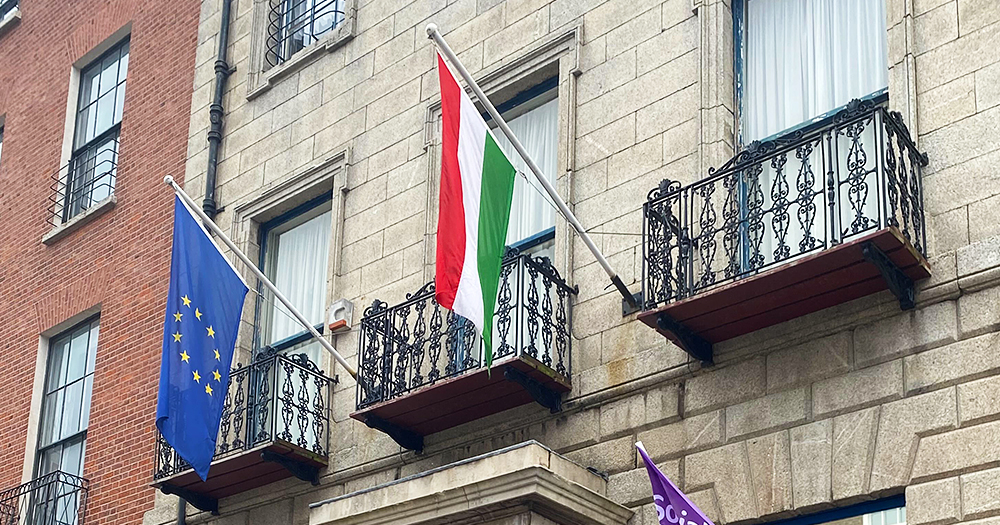A total of 17 EU member states, including Ireland, have jointly expressed grave concern over Hungary’s law banning LGBTQ+ Pride marches, warning that the legislation contradicts the core principles of the European Union.
In a joint declaration, Austria, Belgium, Czechia, Denmark, Estonia, Finland, France, Germany, Ireland, Latvia, Lithuania, Luxembourg, the Netherlands, Portugal, Slovenia, Spain, and Sweden condemned the move, calling it a direct violation of fundamental rights protected under EU law.
The law, introduced by Prime Minister Viktor Orbán’s Fidesz party, not only prohibits the LGBTQ+ community from holding its annual Pride events but also allows authorities to use facial-recognition software to identify participants. Hungary is now the first country in the EU to enforce a nationwide ban on LGBTQ+ Pride celebrations.
The 17 member states declared that the Hungarian measures “run contrary to the fundamental values of human dignity, freedom, equality and respect for human rights, as laid down in Article 2 of the Treaty on European Union.”
“Respecting and protecting the human rights and fundamental freedoms of all people, including LGBTIQ+ persons, is inherent in being part of the European family,” the declaration continued.
The signatories are urging Hungary to reverse its decision, warning that such legal actions contribute to a dangerous rollback on civil liberties within the Union. They emphasised that EU membership entails upholding shared values, including the protection of minority rights and the promotion of inclusivity.
They also urged the European Commission “to expeditiously make full use of the rule of law toolbox at its disposal in case these measures are not revised”.
As Ministers for 🇪🇺Affairs meet in Brussels, joint statement by 🇮🇪 with 🇦🇹🇧🇪🇨🇿🇩🇰🇪🇪🇫🇮🇫🇷🇩🇪🇱🇻🇱🇹🇱🇺🇳🇱🇵🇹🇸🇮🇪🇸🇸🇪 on the infringement of the fundamental rights of LGBTIQ+ persons in 🇭🇺. pic.twitter.com/j9KEznQXU2
— Ireland in Hungary (@irlembbudapest) May 27, 2025
The legislation has sparked widespread criticism from human rights organisations and LGBTQ+ advocacy groups, who accuse the Orbán government of pursuing an increasingly authoritarian agenda. Observers see the ban as part of a broader campaign by Hungarian authorities to marginalise LGBTQ+ people.
This united response by nearly two-thirds of the EU’s member states reflects growing frustration over Hungary’s repeated defiance of EU standards on the rule of law and human rights. While the European Commission has yet to make a formal statement, legal experts suggest the legislation could face challenges under EU treaties and anti-discrimination laws.
EU Commissioner for Democracy Michael McGrath stated: “We believe it is a breach of EU law… And we have asked the Hungarian government to withdraw that draft law. And in the absence of that happening, and should they proceed to legislate and enact this legislation, we stand ready to use the tools at our disposal.”
For now, the 17 countries are calling on Hungary to “revise these measures without delay” and recommit to the principles that bind the European Union together.
© 2025 GCN (Gay Community News). All rights reserved.
Support GCN
GCN is a free, vital resource for Ireland’s LGBTQ+ community since 1988.
GCN is a trading name of National LGBT Federation CLG, a registered charity - Charity Number: 20034580.
GCN relies on the generous support of the community and allies to sustain the crucial work that we do. Producing GCN is costly, and, in an industry which has been hugely impacted by rising costs, we need your support to help sustain and grow this vital resource.
Supporting GCN for as little as €1.99 per month will help us continue our work as Ireland’s free, independent LGBTQ+ media.
